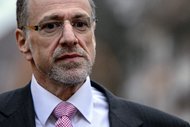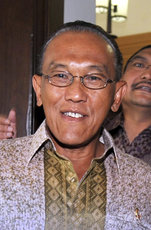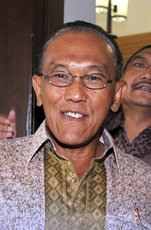 Fabrice Coffrini/Agence France-Presse — Getty ImagesMick Davis, chief of Xstrata, was expected to head the merged company for six months but will now step down as soon as the takeover is finished.
Fabrice Coffrini/Agence France-Presse — Getty ImagesMick Davis, chief of Xstrata, was expected to head the merged company for six months but will now step down as soon as the takeover is finished.
LONDON – The commodities trader Glencore International received final regulatory approval from China on Tuesday, clearing the way for its proposed $30 billion takeover of the mining company Xstrata.
To ease Chinese antitrust concerns, Glencore said it would sell a Peruvian copper mine currently owned by Xstrata.
The combined mining and commodities trading company would be one of the world’s largest producers of copper, and the Chinese authorities had been worried that its local companies might face higher prices for a variety of metals.
The Ministry of Commerce, which dragged its feet for more than a year after Xstrata’s shareholders initially balked at the price of the proposed all-share offer from Glencore, is the final regulator to back the deal.
European antitrust authorities approved the takeover in November after Glencore agreed to sell assets and reduce its operations on the Continent, while South African regulators signed off on the deal this year.
Shares of Glencore rose 3.5 percent in afternoon trading in London, while Xstrata’s shares rose 4.5 percent.
Glencore said Mick Davis, the chief executive of Xstrata who was expected to head the merged company for six months, would now step down as soon as the takeover was completed.
Mr. Davis had been at the center of tense negotiations last year as the sovereign wealth fund Qatar Holding, a large Xstrata shareholder, pressed Glencore to improve its original offer.
Glencore eventually relented, raising its offer to 3.05 of its shares for each Xstrata share from its initial 2.8-share proposal.
In return, however, Glencore had demanded that its chief executive, Ivan Glasenberg, take over from Mr. Davis of Xstrata earlier than previously announced.
The original takeover offer had called for three Xstrata executives – Mr. Davis; John Bond, the chairman; and Trevor Reid, the chief financial officer – to hold the same positions at the merged company.
The agreement with China’s antitrust authorities requires Glencore to sell Xstrata’s Las Bambas copper mine in Peru. Glencore said it would inform the regulators about the sale no later than the end of July, with a potential sale to be completed by next summer.
Glencore also agreed to supply Chinese companies with a minimum amount of copper, zinc and lead concentrate through the end of the decade to ease concerns that China might face shortages metals needed for its local economy.
The deal is expected to be completed next month.
Article source: http://dealbook.nytimes.com/2013/04/16/glencores-30-billion-takeover-of-xstrata-gains-chinese-approval/?partner=rss&emc=rss






